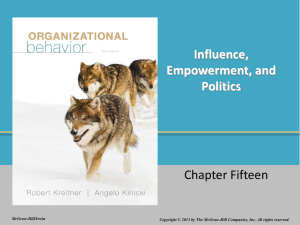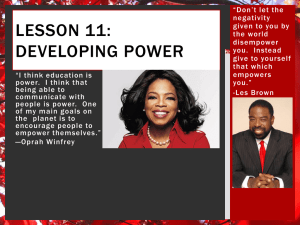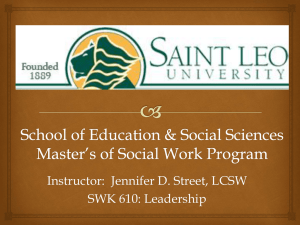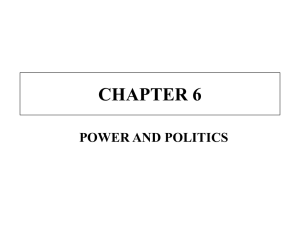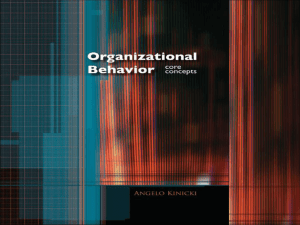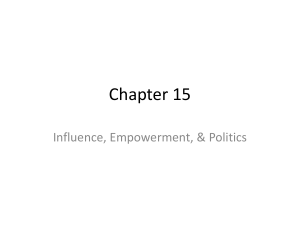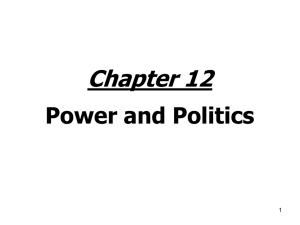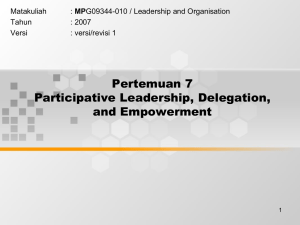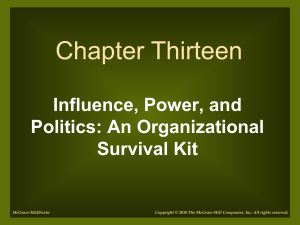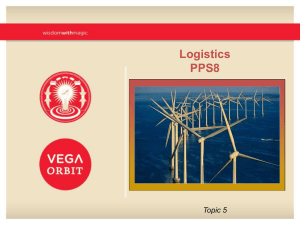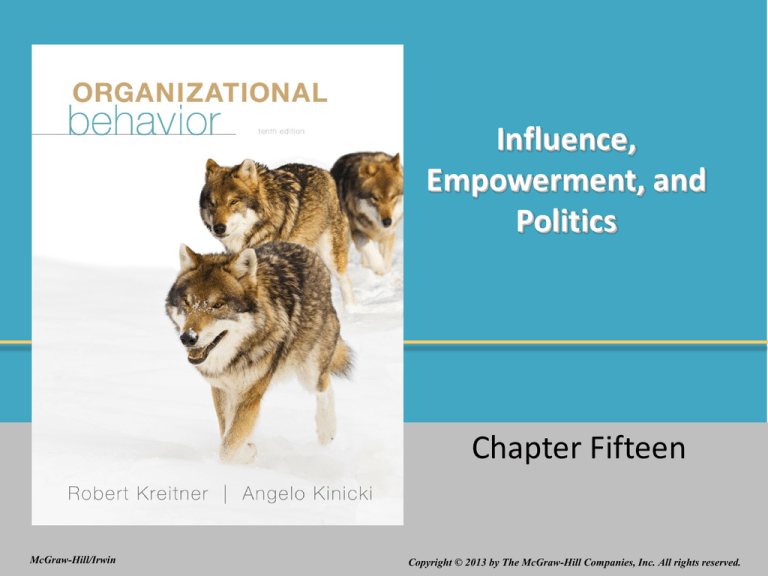
Influence,
Empowerment, and
Politics
Chapter Fifteen
McGraw-Hill/Irwin
© 2013
The McGraw-Hill Companies, Inc. All rights reserved.
Copyright © 2013 by The McGraw-Hill Companies, Inc. All rights reserved.
Nine Generic Influence Tactics
1.
2.
3.
4.
5.
Rational
persuasion
Inspirational
appeals
Consultation
Ingratiation
Personal appeals
6.
7.
8.
9.
Exchange
Coalition tactics
Pressure
Legitimating tactics
15-2
Three Possible Influence Outcomes
1. Commitment
substantial agreement followed by initiative
and persistence in pursuit of common goals
2. Compliance
reluctant agreement requiring subsequent
prodding to satisfy minimum requirements
15-3
Three Influence Outcomes
3. Resistance
stalling, unproductive arguing, or outright
rejection
15-4
Practical Research Insights
Commitment is more likely when people rely on
strong rational persuasion and do not rely on
pressure and coalition tactics.
Ingratiation can slightly improve your performance
appraisal results and make your boss like you
significantly more.
Interpersonal influence is culture bound.
15-5
Social Power
Social power
ability to marshal the
human,
informational, and
material resources to
get something done
15-6
Two Types of Power
Socialized power
plans, self-doubts,
mixed outcomes
and concerns for
others
Personalized
power
expressions of
power for the sake
of personal
aggrandizement
become paramount
15-7
Personalized Power
Personalized power is exhibited when
managers:
Focus more on satisfying their own needs.
Focus less on the needs of their underlings.
Act like “the rules” others are expected to
follow don’t apply to them
15-8
Five Bases or Power
Reward
Referent
Expert
Coercive
Legitimate
15-9
Five Bases of Power
Reward power
obtaining compliance by promising or granting
rewards.
Coercive power
obtaining compliance through threatened or
actual punishment.
Legitimate power
obtaining compliance through formal authority.
15-10
Five Bases of Power
Expert power
obtaining compliance through one’s knowledge
or information.
Referent power
obtaining compliance through charisma or
personal attraction.
15-11
Question?
As a Division Head, Natalie is implementing
pay-for-performance plans and positive
reinforcement programs at Goodwill Wireless
Center. Natalie is attempting to exploit which
power?
A.Coercive
B.Expert
C.Referent
D.Reward
15-12
Research Insights about Social Power
Expert and referent power had a generally
positive effect
Reward and legitimate power had a slightly
positive effect
Coercive power had a slightly negative
effect
15-13
Empowerment: From Power
Sharing to Power Distribution
Empowerment
recognizing and releasing into the organization
the power that people already have in their
wealth of useful knowledge, experience, and
internal motivation.
15-14
The Evolution of Power
15-15
Participative Management
Participative management
process whereby employees play a direct role
in setting goals, making decisions, solving
problems, and making changes in the
organization
15-16
Participative Management
Participative management helps employees
fulfill three basic needs:
Autonomy
Meaningfulness of work
Interpersonal contact
15-17
Question?
Herman is able to work more on his own now
that his supervisor has given him more
responsibility and authority in his job. Which
need of participative management does this
fulfill?
A.
B.
C.
D.
Autonomy
Meaningfulness of work
Interpersonal contact
Sovereignty
15-18
Delegation
Delegation
the process of granting decision-making
authority to lower-level employees
amounts to power distribution
15-19
Barriers to Delegation
Belief in the fallacy, “If you want it done right, do it
yourself.”
Lack of confidence and trust in lower-level
employees.
Low self-confidence.
Fear of being called lazy.
Vague job definition.
Fear of competition from those below
15-20
Personal Initiative: The Other Side of
Delegation
15-21
Domain of Organizational Politics
Organizational politics
intentional acts of influence to enhance or
protect the self-interests of individuals or
groups
15-22
Levels of Political Action in
Organizations
15-23
Levels of Political Action
Coalition
an informal group bound together by the active
pursuit of a single issue
15-24
Common Political Tactics in
Organizations
15-25

